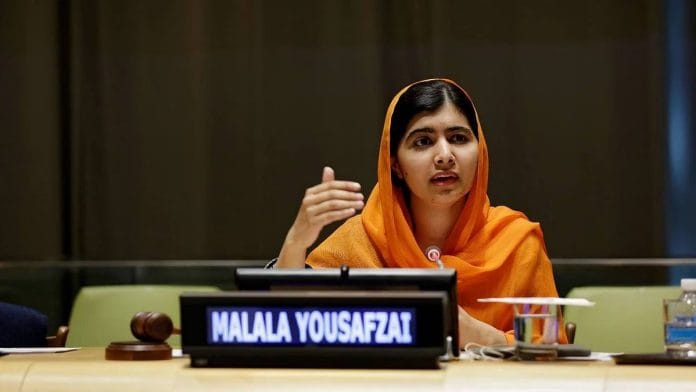New Delhi: Pakistan’s decision to host a high-profile event focused on empowering Muslim girls through education has been interpreted by geopolitical experts as a direct snub to the Taliban regime. While many on the internet support the move, others call it ‘propaganda’.
The country hosted a two-day summit on girls’ education in Muslim-majority communities. The event, hosted in Islamabad, on Saturday brought together over 150 dignitaries from 44 countries, with figures like Malala Yousafzai joining the conversation. Malala, who survived a Taliban assassination attempt in 2012 for advocating girls’ right to education in Pakistan, declared on X, “I will speak about protecting rights for all girls to go to school, and why leaders must hold the Taliban accountable for their crimes against Afghan women & girls.”
Prime Minister Shehbaz Sharif emphasized the importance of assuring women that their rights would be upheld, their aspirations supported, and that no cultural or societal barriers would hinder their dreams. He acknowledged that, despite the Muslim world’s rich legacy, countries like Pakistan continue to face significant challenges in providing equal educational opportunities for girls. He stated that denying girls an education is effectively denying them the chance for a brighter future, Dawn reported.
The event, organised by the Muslim World League (MWL) in partnership with Pakistan, sought to emphasise the importance of women’s education in Muslim societies and combat the misinformation surrounding the issue.
Sharif also announced that the upcoming signing of the ‘Islamabad Declaration,’ aligns with the United Nations’ goals and represents a shared aspiration for the Muslim Ummah.
Although Pakistan extended an invitation to its neighbour, Afghanistan declined to participate, reinforcing the ongoing tensions between the two countries. Since the Taliban’s return to power, Pakistan has found itself walking a fine line—publicly critical of the Taliban’s stance on education and women’s rights while simultaneously managing complex diplomatic relations with the new Afghan leadership.
The subject of the summit has become a matter of debate on social media, particularly over its apparent intent to challenge the Taliban’s controversial policies on girls’ education and has sparked a range of reactions.
Former US diplomat Zalmay Khalilzad called the summit a “propaganda move” aimed at embarrassing the Taliban. In his view, the summit was less about education and more about geopolitical maneuvering. He posed a question: “When will the sensible elements of the Taliban and other Afghans stand up against the ill-guided decisions from Kandahar?”
Not everyone agreed with Khalilzad.
Pak-Afghan Youth Forum, a social media collective, called out Khalilzad’s dismissal of the summit on X, accusing him of deflecting blame for the failures of the previous two decades of US involvement in Afghanistan.
“Your attempt to discredit the International Conference on Girls’ Education in Muslim Communities is not only intellectually lazy but also reflective of the very missteps that led to Afghanistan’s current plight under your watch” they wrote.
X user Momin Sheikh agreed: “We’re organising a women’s education conference to spite the Taliban? Great! We should spite the Taliban more. Taliban’s extremist version of religion enjoys great influence in Pakistan and when they deploy regressive policies targeting women, many in Pak replicate them in their households”.
Pakistani officials, however, insist that their actions are rooted in a genuine commitment to education and Islamic values. Khalid Maqbool Siddiqui, Pakistan’s Education Minister, emphasised that the summit’s primary goal was to stress the Islamic principle that both men and women have an equal right to education. “In Islam, there is no justification for restricting women’s education,” he said, adding that the summit would culminate in an “Islamabad Declaration,” which would outline decisive steps for transforming girls’ education in the Islamic world, Arab News reported.
Also read: ‘Uraan Pakistan’ is Shehbaz Sharif’s plan to revive economy. Pakistanis say it’s wingless
Irony isn’t lost on Pakistanis
“Pakistan has no rights whatsoever to speak regarding #WomensRights as they have snatched rights from not ONLY women in Balochistan, KPK, but recently in Punjab where innocent women are being held in prisons with no evidence proof of ANY Crime committed by them! … The Fascist Pakistan Establishment #AsimMunir and current Government #PDM MUST be held accountable and obviously have no rights in organization of something they are complicit in themselves!”, X user @AlphaBravoCharlie wrote.
Others agreed. X user @shazzy said that “ Pakistan itself mired in grave violations of human rights, disrespect towards women, and heinous acts such as raiding homes, has no moral ground to lecture or attack another nation—even if the point being made is valid.”
Others took to reminding Pakistan about its own crimes. Haider Hashmi, who calls himself a supporter of Taliban government in his bio, pointed out the case of Aafia Siddiqui, the Pakistani neuroscientist currently serving an 86 year sentence over alleged murder in the US. Many in Pakistan have urged for her release and call the cases against her as fake.
‘If they truly cared about women’s education and rights, they should have first advocated for the release and justice of our sister Dr. Aafia Siddiqui,” hashmi wrote on X.
(Edited by Ratan Priya)






